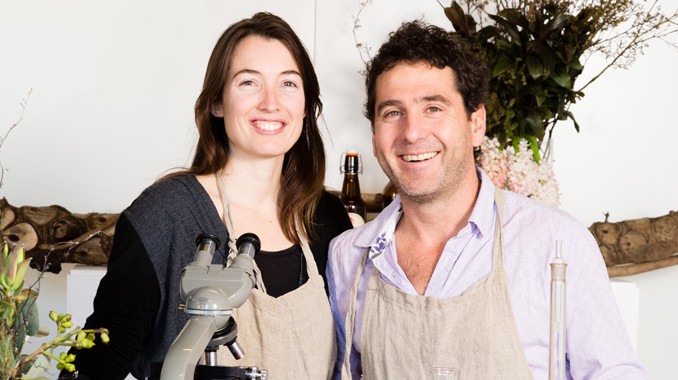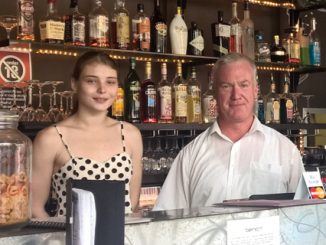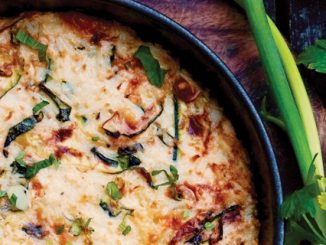
Bobbi Lewin lifts the lid on a new artisanal community growing in the Inner West. These so-called ‘feremontos’ are not afraid to let the good things grow.
Great-Grandma didn’t know what a probiotic was, but when she lifted the lid from the sauerkraut crock, she knew by the pungent, earthy aroma when it was ready, and that it was good for her family.
Almost all traditional cultures fermented various foods for means of preservation, or to make alcohol. Lacto-fermentation goes back to the earliest agricultural societies, who dug pits in the earth, lined them with leaves and filled them with vegetables, grains, meat, tubers and other foods. In this anaerobic environment, the good bacteria (mostly lactobacillus), already present in the foods, breaks down the sugars present and produces lactic acid, which prevents the food from rotting.
Crocks and jars of European sauerkraut, Korean kimchi, and Mexican posole are all examples of lacto-fermentation. Cultured dairy products such as milk kefir from the Caucasus Mountains and yoghurt from South-Eastern Europe and the Mediterranean all contain lactobacillus. Kombucha, from ancient China, and water kefir or tibicos, from Mexico, are both fermented, non-alcoholic (less than 1/2-1%) beverages.
These traditional fermented foods all provided probiotics: good bacteria that are beneficial to our health. However, with the advent of modern means of food preservation, fermented foods fell out of favour. Today, a community of health minded people are bringing back the culture of fermenting, a culture, which is bubbling over in Sydney’s Inner West.
Kombucha from the heart
Matt and Lara Ball create their signature Wild Kombucha at the Kombucha Bar & Art-Food-Medicine Collaboratory in Leichhardt. “It’s a living drink,” Matt tells me, a mix of green and black tea and raw organic cane sugar, fermented with a mother culture. (This is called a SCOBY: symbiotic colony of bacteria and yeast). Kombucha has experienced a huge resurgence in recent years. Devotees of the beverage swear by its benefits for the digestive system.
Matt and Lara tell me that the Wild Kombucha brand is about more than just kombucha. “It’s a fun, different aspect … not just a bottle off the shelf,” Matt says. “It’s about the experience.” The experience is not only enjoying a healthful, energising beverage, but one of community. The Parramatta Rd store the kombucha is brewed in is also a tasting bar, with kombucha on tap, and a space where local fermenters can collaborate and support each other. In this hidden oasis, Matt and Lara also host pop-up food events, pairing kombucha with the food menu.
Soon to be on the calendar are workshops, such as fermenting kombucha and other cultured edibles. Lara says this collaboration with the local community was always part of their vision.
Wild Kombucha is also about keeping the environment healthy. “We’re very much about supporting the concept of sustainability,” Matt says. They have specifically made their glass, take-away bottles so that they can be returned and refilled with their ongoing Kombucha flavours, or one of their seasonal blends, such as spicy cayenne and turmeric or nettle and rosella.
For more info visit: www.wildkombucha.com
The king of culture
Mishae Bailitis, creator of The Culture Guys, makes a traditional raw organic sauerkraut and his own interpretation of kimchi. “I like the ginger up front, but a background heat with the chilli,” he Mishae says. He uses all certified organic produce, which he sources locally, and a mineral rich Celtic sea salt, and then ferments the vegetables in traditional ceramic crocks. Fermented vegetables are full of living bacteria and enzymes that aid in digestion.
While the foundations of his product remain consistent, the personality transforms according to the season and produce available. “Everything varies and changes the dynamic of the kimchi, so I embrace that,” says Mishae. A surplus of chillies has resulted in an extra-spicy batch of kimchi coming up.
Mishae’s own health issues inspired his turn to fermenting. It was the first thing he found that made an immediate and significant impact on his health. “Something that makes you feel better when you’re suffering is a wonderful thing,” he says. He then decided he wanted to share this passion for fermented foods with the public through The Culture Guys.
When asked about the renewed interest in cultured foods, he tells me, “dis-ease, people not feeling well,” is what draws people to fermenting. A majority of people he’s met have some sort of gut imbalance or digestion issue, which he attributes to overuse of antibiotics, as well as pesticides on foods, knocking out our natural gut flora. “The further we move away from nature, the more we are going to suffer,” he says. This creates a yearning to return to health.
The Culture Guys sauerkraut and kimchi are available at Orange Grove and other farmers markets. Learn more at www.facebook.com/thecultureguys.
Creating with probiotics
I first encountered Cultured Artisans a couple months ago when they sold me a lively kombucha SCOBY. Gillian Kozicki discovered the importance of probiotics while studying on a permaculture farm in Tennessee. There she met fermentation guru Sandor Katz, who spoke of the interconnection of our guts to the soil and the importance of ensuring our continued health, through sharing the lost art of fermenting. Gillian came back to Australia and after much more learning, realised she had to bring her passion for empowering people with these skills to the broader community.
Cultured Artisan classes teach what Gillian refers to as the ‘pillars’ of fermented foods: milk kefir, water kefir, kombucha, and fermented and brined vegetables. Because we’ve become unaccustomed to the strong flavours of ferments, Gillian is committed to a gentle approach in re-introducing people to these foods. She explained to me how you can entice people into trying fermented foods by using colour and flavour, such as making sweet or savoury dips from milk kefir, mild traditional sauerkraut or a sweet kraut using apples and juniper berries. You can use fruit in water kefir to lure children off sugary soft drinks. Gillian’s relaxed approach shows people that the skills our grandparents honed are easy and accessible, and can fit into individual schedules and budgets.
Gillian explains that by bringing fermented foods back into our diets, we are taking control of our health. “When we empower ourselves to health,” she says, “we’re also reconnecting with family; building community.”
“We connect to the soil because all of the sudden it becomes crucial that we’ve actually got microbes on our food. You need to ferment food that is healthy, so you start to ask questions about insecticides and what is being done,” she says.
This attitude also leads us to seek out the people growing and making our food.
“It’s like our whole world subtly shifts through this. It’s a gradual waking up; it’s an energising, an adventure, and it’s beautiful.”
Cultured Artisan classes are available at a variety of venues in the Inner-West. www.culturedartisans.com.au
What is Fermentation?
According to fermentation expert, Sandor Katz, “fermentation is the transformation of food by various bacteria, fungi, and the enzymes they produce.” Over time, people have learned to use this process to preserve food, make it more digestible, more delicious, and in some cases, less toxic.
The fermenting process preserves vitamins and minerals, and in some cases creates new nutrients, such as B vitamins formed when fermenting beer, soy sauce, and some grains. The sauerkraut Captain Cook fed to his crew kept them free of scurvy because of its high vitamin C content.
A third of the world’s diet is fermented. Chocolate, vanilla, coffee, cheese, vinegar, soy sauce, miso, olives, some teas, corned beef, pastrami, prosciutto, salami are all fermented foods.
Making probiotics a priority
If you are unaccustomed to a probiotic diet, introduce these foods slowly, starting with just 1-2 teaspoons a day, and increase this as your body adjusts.
Feed the probiotics with prebiotics such as undigestible carbohydrates found in onions, garlic, asparagus, whole wheat, and leafy greens. A diet high in refined carbohydrates causes a proliferation of unhealthy gut bacteria.


